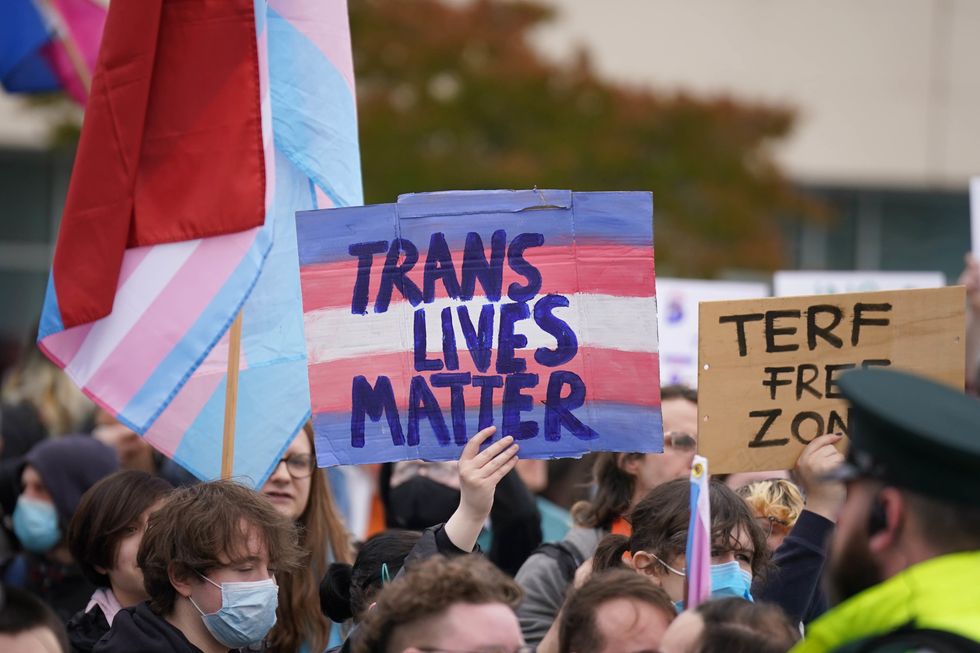Leaked messages reveal BBC staff calling for a whistleblower to be sacked and accusing the broadcaster of spreading transphobia
Leaked messages reveal BBC staff calling for a whistleblower to be sacked and accusing the broadcaster of spreading transphobia
Don't Miss
Most Read
Trending on GB News
BBC staff have been accused of launching a witch hunt against a whistleblower who raised concerns about the channel’s “capitulation to extreme trans rights ideologues,” GB News can reveal.
Leaked messages on an internal BBC communication board, seen by GB News, featured calls from staff to identify the whistleblower and sack them.
Responding to an article written by an anonymous BBC journalist in The Spectator, one BBC employee wrote to his colleagues “this person needs IDing [identifying] and then sacking” on an internal slack communication channel.
Another wrote that the whistleblower was “very happy to breach the terms of their employment” and a separate employee followed up with, “Who's up for an incredibly [s**t] game of Guess Who?”.
 Trans rivals fear death threats and a backlash if they speak publiclyPA
Trans rivals fear death threats and a backlash if they speak publiclyPAThe whistleblower wrote that the BBC had contributed to a “skewed and distorted national conversation around the issue of sex and gender” and “placed so-called progressive values ahead of evidence, risking real-world harms to countless vulnerable young people”.
Cath Walton, a former BBC journalist who was disciplined for raising concerns about the broadcaster’s impartiality on gender issues, told GB News: “Gender activists inside the BBC have always been incredibly confident about operating without any fear of repercussions.”
“If anyone was saying this kind of thing on a BBC forum about trans campaigners and contributors they’d be reported to HR. Managers need to get a grip on internal activism, it adds to the chilling effect on impartiality, especially when it’s going to be a very hot political topic in an election year.”
“This looks like a witch-hunt of a whistle-blower. Managers should ensure staff with such campaigning views are nowhere near gender content.”
 Trans protestersPA
Trans protestersPAThe BBC’s Slack messaging boards are used by almost 5,000 staff, representing around a quarter of the BBC’s total employees, and users include senior journalists, producers and editors.
Internally, Slack is used to regularly discuss current affairs, and the BBC’s own editorial output.
On 21 November 2023, linking to a BBC News story headlined “Transgender women banned from playing international women's cricket by ICC” one employee described it as “the usual BBC transphobia”.
Several others concurred with a series of comments; one simply read “Jesus” with an facepalm emoji, another said, in relation to the story using a quote from the Women’s Rights Network, “It is not OK for us to quote a single-issue anti-trans group without describing them as such. And would we even quote a single-issue group that opposed the social participation and inclusion of people with any other protected characteristic?”.
Another said in response: “Well the UK broadcasters do regularly give a platform for the likes of Farage without context” and linked to another BBC report from the former swimmer Sharon Davies who believes transgender athletes should not participate in women’s sports, saying: “and then of course Davis gets whole pieces that promote her political viewpoint”.
Maya Forstater, Chief executive of Sex Matters, a human rights charity, said: “This is how deeply embedded transgender activism is at the BBC. A single journalist dares to criticise, anonymously, and the heresy-hunters are out in force on its internal messaging board.”
“During the past decade the BBC has granted trans activist lobby groups free rein to embed their views within its workplace processes and editorial decision-making, handing enormous power to ideologues.”
She continued: “The era of ‘no debate’ is coming to an end, so staff at ideologically captured workplaces will have to get used to whistleblowers.”
“People with gender-critical views, such as those outlined in the recent Spectator article by the BBC whistleblower, are protected against harassment and discrimination.
"Those calling for this employee to be sacked are not only inflammatory but committing discrimination and harassment themselves, and demanding that BBC management behave unlawfully.”
The BBC were approached for comment.
You may like




